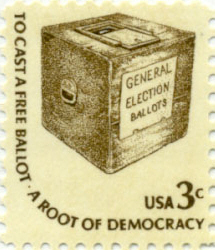Among the
most fundamental rights necessary in a democracy
is the freedom and ability for common citizens
to seek public office without undue limitations,
complexities and intimidations. It is the PPC
belief that ballot access should be structured
to encourage candidacies, not discourage them.
The rules and procedures should be readily
understandable by average citizens without the
need for expensive professional and legal
assistance. Laws should not be established that
thwart the manifest will of the public to
produce candidacies.
Illinois is
among the leading states in ballot access
complexity. Under the specious argument of
ballot security, the political leaders have
created an incumbent friendly system. In many
cases, signature requirements are needless high
– creating an exceptional barrier to
non-incumbents and those without extensive
financial resources or established political
organization.
While many
claim these requirements are for the public
benefit, the contention is contrary to examples
in other states and cities. In fact, many
states, with pristine reputations for political
honesty, provide the simplest ballot access
procedures.
 The
Illinois election laws have a complex series of
regulations that create confusion. Minor
violations or errors in filing are often used to
disqualify competent candidates. In many
instance, well-financed incumbents are able to
use even specious challenges to force competent
candidates to withdraw for nothing more than
lack of funds, insufficient time or lack of
understanding of their rights.
The
Illinois election laws have a complex series of
regulations that create confusion. Minor
violations or errors in filing are often used to
disqualify competent candidates. In many
instance, well-financed incumbents are able to
use even specious challenges to force competent
candidates to withdraw for nothing more than
lack of funds, insufficient time or lack of
understanding of their rights.
In other
cases, minor technicalities provide legal
reasons to keep candidates off the ballot.
Often the application of these minor legal
infractions is arbitrary. Political appointees
have enormous power to decide the fate of a
candidate despite the law. Once a candidate has
received a sufficient (and reasonable) number of
qualifying petition signatures, no minor
technical error should result in
disqualifications. Both the laws and the courts
should bias in favor of obvious voter intent.
-
Virtually end petition fraud.
- End
time consuming and expensive challenges.
- Assure
voters greater choice in candidates.
- Broaden
the democratic experience.
There are no downsides for the
public. The only losers are incumbent office
holders, who fear rejection by the public. No
public official should be able to continue in
office by technical manipulations over public
mandate. Election lawyers may lose business,
but such business is only available through laws
that artificially create litigation. This is
simply an intolerable financial and civic burden
on the general public.